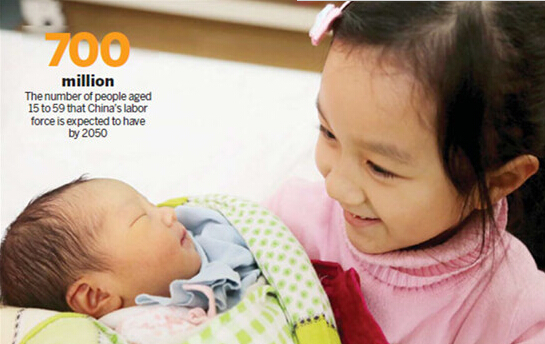Second child brings happiness, survey finds
 |
|
Xue yaqing, 6, holds her brother on New Year’s Day at No 1 Hospital in Xiangyang, Hubei province. The newborn is the second child of a couple from the city in Central China. [Photo: Xinhua] |
Most mothers in China feel they are happier after having a second child, according to a survey report released a year after the country relaxed its family planning policy.
The report, released on Sunday, was based on an online survey of about 4,200 mothers with two children. The survey found that about 63 percent of the respondents said they were happier after the birth of their second child, and 67 percent said they did not regret having another baby.
The survey of parents conducted this month was led by mama.cn, a website for Chinese mothers, and Muruai, a voluntary group based in Guangzhou, Guangdong province, that promotes breast-feeding. Of the 4,182 respondents, 4,151 were mothers.
The major reasons given for the increase in happiness after a second child included seeing their children play together and the fact that some couples now had both a boy and a girl, according to the report.
Nearly half of the mothers also said their husbands were more willing to help take care of the children after the second child, according to the report.
The survey also found some factors that caused unhappiness after a second child, such as the economic burden and the extra pressure resulting from the need to devote more time and energy.
About 72 percent of those surveyed said they may face heavier burdens to take care of their parents while having to raise two children, while less than 7 percent of mothers with a second child felt they had better career opportunities after having a second child.
More than 70 percent said they would not consider having a third child, even if they are allowed to do so in the future.
It was generally believed that many people would not choose to have another baby due to the increased expenditure, said Zhu Yuzi, who worked on the survey for Muruai.
“But the result of the survey shows that the spiritual joy brought by having a second child can greatly offset the increased economic burdens for many Chinese,” she said. “That is why so many people feel happier after having a second child, even with more economic burdens.”
Cai Lina, content supervisor at mama.cn, said that while bringing joy, having a second child can also bring many problems for couples.
“We expect more supportive measures, such as reducing taxes for families with a second child, so the second-child policy can be better carried out.”
Yang Jun, a 36-year-old media employee in Beijing who already has a child, said he will not consider having a second child even if it might bring him more joy.
“Both my wife and I are very busy, so who will take care of the second child if I have one? Besides, having a second child means we have to buy a bigger apartment, which is so expensive in Beijing,” he said.
China adopted the second-child policy at the beginning of last year, encouraging all couples to have two children. The number of newborns in China reached 18.7 million last year, an increase of 11 percent over 2015, and about 45 percent of them were a second child, according to the National Health and Family Planning Commission.

